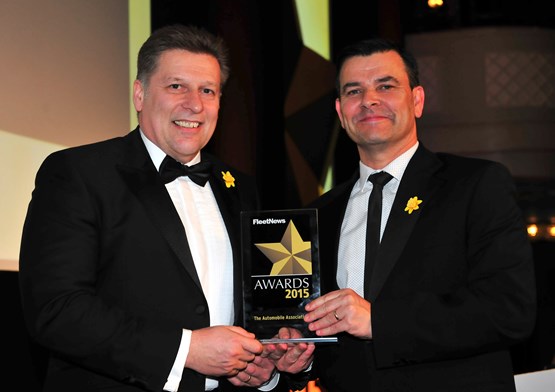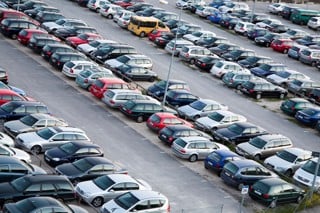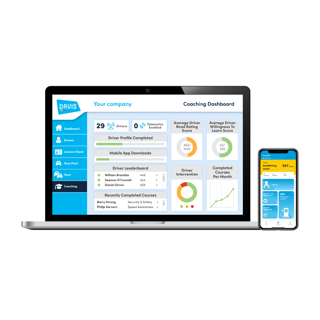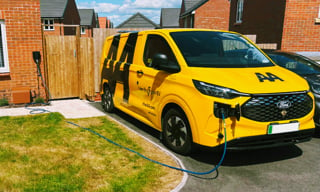
The AA has become a regular visitor to the stage at the Fleet News Awards: it has been named supplier of the year three times in the past five years.
But despite its familiarity with winning the honour, it remains a continuing source of pride to the company.
“We were absolutely delighted to win the Fleet News award for the third time in quick succession,” says Roger Williams, director of fleet services.
“This is reinforcement that we are completely committed to the fleet sector and are supporting it.”
The AA is best known for roadside assistance, with around a third of its 3.5 million breakdown call-outs each year to business and fleet customers, but has been increasing the number of services it offers to all its clients.
These now include driver training and risk management services under its AA Drivetech division, as well as speed awareness courses.
The company’s AutoWindshields division provides windscreen repair and replacement.
Williams says key to The AA’s success in the fleet sector is that it operates its own large fleet, which consists of 3,100 cars and 2,940 vans. “This means we understand the challenges other companies face,” says Williams.
“We know what it means to a company if it has a van off the road for a while because it costs that business money all the time.”
Fleet News: The AA became a PLC last year after being owned by private equity for 10 years. What will that mean to your fleet services?
Roger Williams: Private equity has different objectives to a PLC-type organisation; with a PLC it’s very much about investing in the long-term health of the business.
We have made some very significant investments already, such as Bosch diagnostic equipment for our patrols.
This allows us to get deeper into the engine management system and understand a fault in more depth, which helps increase fix rates.
As a business, we are spending £130 million on new IT systems during the next year or so and some of those will help deliver service to fleets in terms of our core system.
Our core system is called AA Help and, while we’re keeping the algorithm the same because we didn’t feel we could improve on that, we’re looking at investments based around improving the digital connectivity of the system and enhancing the management information capability.
FN: What will that mean for fleets?
RW: We attend around 3.5m breakdowns a year, and fleets and businesses will benefit from services which can be applied to all call-outs.
The digital side is important to us. Our AA Breakdown app allows drivers to report a breakdown at the side of the road without actually speaking to anyone. It’s a clever piece of software. At the moment 5% of personal breakdowns are reported that way and we see the use of that increasing across all our customers.
One of the benefits of that for a customer is that they are constantly in touch; it allows them to track the patrol which is coming to help them. It offers a good customer experience.
The other thing is telematics. More and more, we are taking data from a number of manufacturers in the event of a breakdown and I think there will be a tendency for vehicle data to be imported into breakdown providers.
It’s a little bit in the future, but we want to be able to take that data from whatever source it’s coming from.
There are aftermarket devices that already export data and vehicles will follow.
Different manufacturers are already taking different stances on this, but wouldn’t it be great if a breakdown company could get hold of data of what’s going on with a vehicle and use it to help with the breakdown repair?
I don’t think anyone is quite there yet, but this is the kind of thing that is going to happen. We are making sure we are able to receive the data and that is an important link in the chain because I’m convinced that, with our technical expertise, we could make use of it effectively.
FN: What do the next 12 months have in store for The AA?
RW: The main message is that we are continuing to invest in improving the customer experience, and some of that will be delivered by the new IT systems.
Our patrols are receiving iPhone 6s which will improve how they communicate with customers and the office.
Our patrols also have onboard electric trailers which fold out from under the van’s tailgate, and we are about halfway through replacing those with devices which have a better weight capacity, are quicker deploying and are also able to take motorcycles.
FN: Are SME fleets still a focus for The AA?
RW: Yes, very much so. We are committed to the SME sector and are trying to grow that business.
SMEs are getting a lot more attention from the whole of the fleet industry these days. We have all-round packages which we offer to SMEs, while more leasing companies are targeting them than in the past.
We’ve got one or two extra products and services on the way, which I can’t talk about, but which we hope are appropriate for the SME sector.
FN: How have you been able to improve service levels for fleet customers?
RW: Constant investment in new technology and ensuring that patrols are equipped to fix as many vehicles as possible.
The best experience of a roadside job is ensuring our patrols have all the tools to do their job effectively and quickly.
This is why we’ve invested in the Bosch diagnostic technology; it’s about fixing the vehicle or reaching the decision that you can’t fix the vehicle quicker. The last thing you want is someone trying to fix a vehicle for an hour and then saying they need to get a recovery truck. It’s much better to know sooner that something can’t be fixed at the roadside. That’s the area where people can see most improvement in the customer experience.
The AA also provides manufacturer breakdown services for a number of brands with a strong fleet presence, and has taken on Volkswagen Group’s contract, responding to call-outs from drivers of Volkswagen, Škoda, Seat and Audi vehicles. “We’ve seen some pretty good growth in this area,” says Williams.
“Winning the Volkswagen Group roadside contract was good for us in terms of growth.
“One of the reasons we were able to secure that contract is that we are part of ARC, which is a collaboration of European breakdown services.
“ARC works to provide a liveried patrol service across most countries in Europe. This means that drivers can go to countries such as Holland and Germany and get a consistent service.”





















Login to comment
Comments
No comments have been made yet.